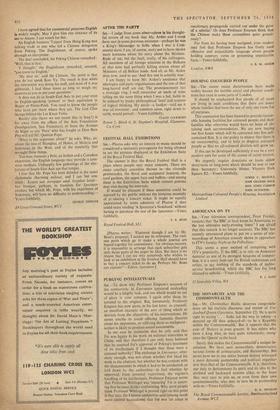PURGING INTELLECTUALS
SIR,—To show why Professor Empson's account of the• controversy in, Encounter appeared misleading would be a lengthy task, and one which would be out of place in your columns. I again refer those in- terested to the original, But, fortunately, Professor Empson has now given, in his last letter to yourself, an excellent example of the sort of thing which so detracts from the objectivity of his interventions. He seems unable to avoid offering fantastic theories about his opponents, or vilifying them as malignant : neither is likely to produce sound assessments. In my case he maintains that he only said that Fei was hippy in his work on national minorities in China, and that therefore I can only have believed that he asserted Fei's approval of Peking's treatment of its intellectuals if I thought that these were a national minority! The exchange in Encounter, obvi- ously enough, was not about whether fei liked his work in the abstract, but whether he was content with the circumstances in which it had to be conducted, as laid down by the authorities—in fact whether he approved, from personal experience, the regime's handling of its intellectuals. Professor Empson wrote that Professor Wittfogel was 'smearing' Fei in assert- ing that he must dislike conforming. Why most people think Professor Wittfogel is proved right on this point is that later the Chinese authorities said (among much more sinister accusations) that Fei was 'an adept in reactionary propaganda carried out under the guise of a scholar.' Or does Professor Empson think that the Chinese make these accusations quite gratuit- ously?
Far from his having been maligned, your readers may feel that Professor Empson has freely used offensive and unjustifiable language about people holding contrary views or presenting unpalatable facts.—Yours faithfully, E. M. ARDEN
London, NW8


































 Previous page
Previous page